A Q&A Interview with Jacques Cabaud, One of Simone Weil’s First Biographers
Jacques Cabaud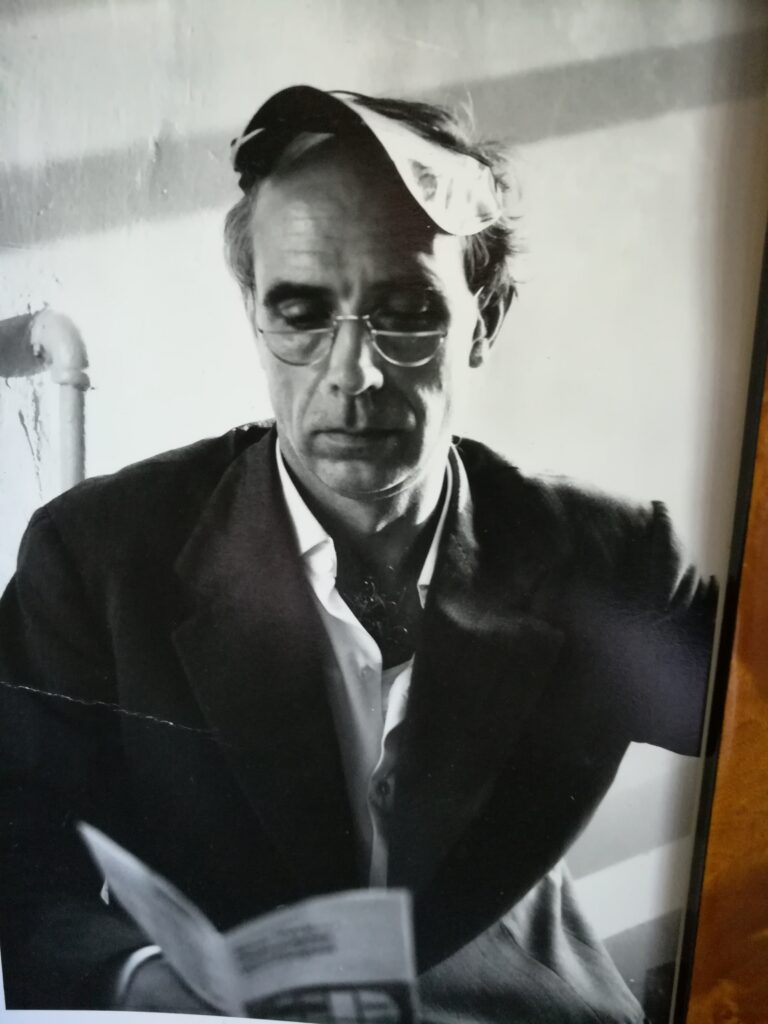
Jacques M. Cabaud (07-04-1923) was born in Norwich, Connecticut but raised in France. He received his Masters in philosophy from Fordham University and his doctorate in French from Columbia University. He returned to France to do research on a doctorate concerning the mysticism of Blaise Pascal. While in Paris, however, he read a newspaper review of Waiting for God, a posthumous collection of Weil’s spiritual writings. The book sparked his interest, so in 1950 (seven years after Weil’s death) he changed his doctoral plans and began biographical research on Weil. His many interviews with Weil’s family and friends not only informed his doctorate but also influenced subsequent books he authored on her; those interviews in turn helped shape subsequent biographical accounts of Weil. Having completed his doctorate, Dr. Cabaud taught at various schools including New York University, St. John’s University, and later at the Gustav Siewerth Academy in Germany.
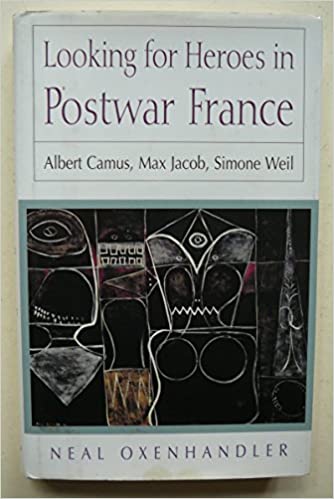
As Neal Oxenhandler (1926-2011: a French literature professor) recalled in his book Looking for Heroes in Postwar France: Albert Camus, Max Jacob, Simone Weil (University Press of New England, 1009), p. 163: “It was from Jacques Cabaud that I learned about Weil. Cabaud was collecting materials for his Ph.D. thesis which would become the first major biographical study of Weil, and he used me to test out his interpretations. The fact that I was a Jew with Catholic leanings made me a useful informant, although at first glance we appeared as very different people.”
First Books On Simone Weil
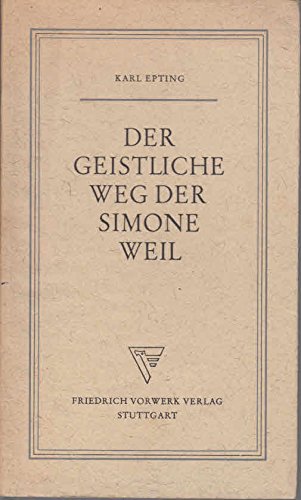
While Dr. Cabaud was the first to author an extended and original-sources biography of Simone Weil, others had previously published books on her, as Cabaud noted in the bibliography of Simone Weil: Fellowship in Love (pp. 384-385):
- Joseph-Marie Perrin & Gustave Thibon, Simone Weil telle que nous l’avons connue, Paris: La Colombe (1952)
- Marie-Magdeleine Davy, Introduction au message de Simone Weil, Paris: Plon (1954)
- Eric W. Tomlin, Simone Weil, New Haven: Yale University Press (1954)
- Paule Bugnion-Secrétan, Simone Weil: itinéraire politique et spirituel, Paris: Messeiller (1954)
- Karl Epting, Der geistliche Weg der Simone Weil, Stuttgart, DE: Friedrich Vorwerk Verlag (1955)
Cabaud’s Writings on Simone Weil in French & English
Jacques Cabaud has authored three books on Simone Weil:
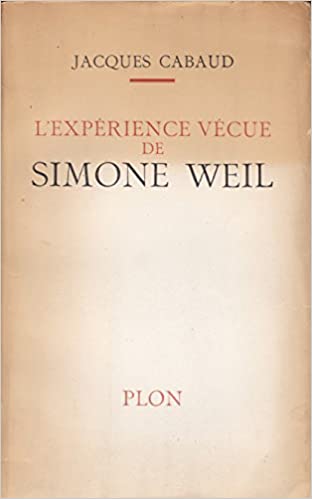
- L’Expérience Vécue de Simone Weil (Paris: Plon, 1957)
- Simone Weil à New York et à Londres : les quinze derniers mois, 1942-1943 (Paris: Plon, 1967)
- and Simone Weil: A Fellowship in Love (UK: Harvill Press, 1964) (book review by Thomas Merton, 1968).
Beyond French and English, his books on Weil have been translated into several languages including German, Japanese, and Chinese.
He has also authored several articles on Weil: “Simone Weil on Communism, Nazism and Pacificism,” Arts and Sciences, vol. II, no. 1 (1963), pp. 7-12; “Note sur Simone Weil et Rosa Luxemburg,” Cahiers Simone Weil, vol. II, no. 1 (March 1979); “Une expérience vécue de Simone Weil : Simone Weil et la marche des mineurs du 3 décembre 1933,” Cahiers Simone Weil, vol. II, no. 1 (March 1979); “Albert Camus et Simone Weil,” Cahiers Simone Weil, vol. VIII, no. 3 (Sept. 1985), reprinted in Kentucky Romance Quarterly (vol. 21, no. 3, (2010), pp. 383-394; “Le rôle de l’intelligence selon Simone Weil,” Cahiers Simone Weil, vol. XXVIII, no. 3 (Sept. 2005); “Simone Weil fût-elle antisémite?,” Cahiers Simone Weil, vol. XXX, no. 4 (Dec. 2007); “Simone Weil: an ethic for esthetics,” Cahiers Simone Weil, vol. XXXI, no. 1 (2008); and with Francis Kaplan, “Deux points de vue sur la question « Simone Weil antisémite? »,” Cahiers Simone Weil, vol. XXXII, no. 1 (March 2009). In 2010 he authored “The Relevance of Simone Weil (1909-1943): 100 Years Later” as a preface to The Relevance of the Radical: Simone Weil 100 Years Later (Continuum, 2010), pp. xvii-xx, edited by A. Rebecca Rozelle-Stone and Lucian Stone.
Currently, at age 98, Dr. Cabaud is in the process of completing two books on the theology of Martin Luther — see e.g. “From Trauma to Dissent: Martin Luther” in Albrecht Graf v. Brandenstein-Zeppelin et al., eds., Divine Reason and Love Incarnated (in German, 2007), pp. 175-197.
Previous Interviews with Cabaud on Simone Weil
In 2000 Cabaud was interviewed by Lyn Gallacher for ABC Radio National. Thereafter, in 2018, he did another interview, this time with Michael Horn for WCAT radio.
The Interview

The following is a transcription of a September 30, 2020 telephone interview with Jacques Cabaud (then residing in Erlangen, Germany) conducted by Ronald Collins (then in Lewes, Delaware). Cabaud’s daughter, Dr. Marie Cabaud Meaney, was also on the recorded call since she was visiting with her father in Germany at the time. A copy of the questions had previously been e-mailed to Drs. Cabaud and Meaney, the latter who read them aloud for her Father to respond to during the 56-minute recorded interview. In a few instances, Dr. Meaney interjected (with her father’s approval) in order to clarify a particular point. The transcript of the early afternoon interview, which was thereafter reviewed and slightly edited by Drs. Cabaud and Meaney, is set out below.
Collins: You published L’ Expérience vécue de Simone Weil (1957) seven years before Simone Weil: A Fellowship in Love was released. How is it that you found your way to Plon instead of Gallimard, which had also begun to publish her works? Was it because Plon had already done so much? – e.g., Gustave Thibon’s La Pésanteur et la grâce in 1948 and then the release of Weil’s notebooks (1951, 1953, & 1956) coupled with the 1954 publication of a work on Weil by Marie-Magdeleine Davy.
Cabaud: The answer is very simple. In those days Gallimard hadn’t taken over. One must not forget that Camus discovered Simone Weil in about 1949; it took some time. Until then, Plon had been the publishing house that wanted to publish Simone Weil’s writings. That is why I went to Plon, and when Plon said “yes” – it was a well-known house — I said “yes.” Gallimard only came into the picture later. When I contracted with Plon – that was 1950 – I had no reason to go to Gallimard since Plon was then the house publishing books by or on Simone Weil.
Interactions with the Weil Family
Collins: In a 2000 interview with Lyn Gallacher, you noted that Weil’s “parents had carefully stored her manuscript writings, which were plentiful.” And then in an endnote to your English biography you expressed your indebtedness to “Simone Weil’s family” for “the biographical information” they provided. How extensive were your dealings with her parents?
Cabaud: [Chuckles] Very extensive! Madame Weil was a motherly person; I mean, it was in her genes. She had two children, and after that she had to have an operation and couldn’t have any more children. She was very motherly with all the young men who came to her, especially the students interested in her daughter. She used to mother them. I don’t mean to say that she’d invite them over for lunch, or supper, or anything like that. She was extremely helpful; she enjoyed seeing them and speaking to them. She was very hospitable, she did this for anyone who came to speak about Simone Weil. I was doing research, so I asked her many questions. She gave me whatever information she could supply.
Collins: You mention Simone’s brother André a few times. Did you interview him?
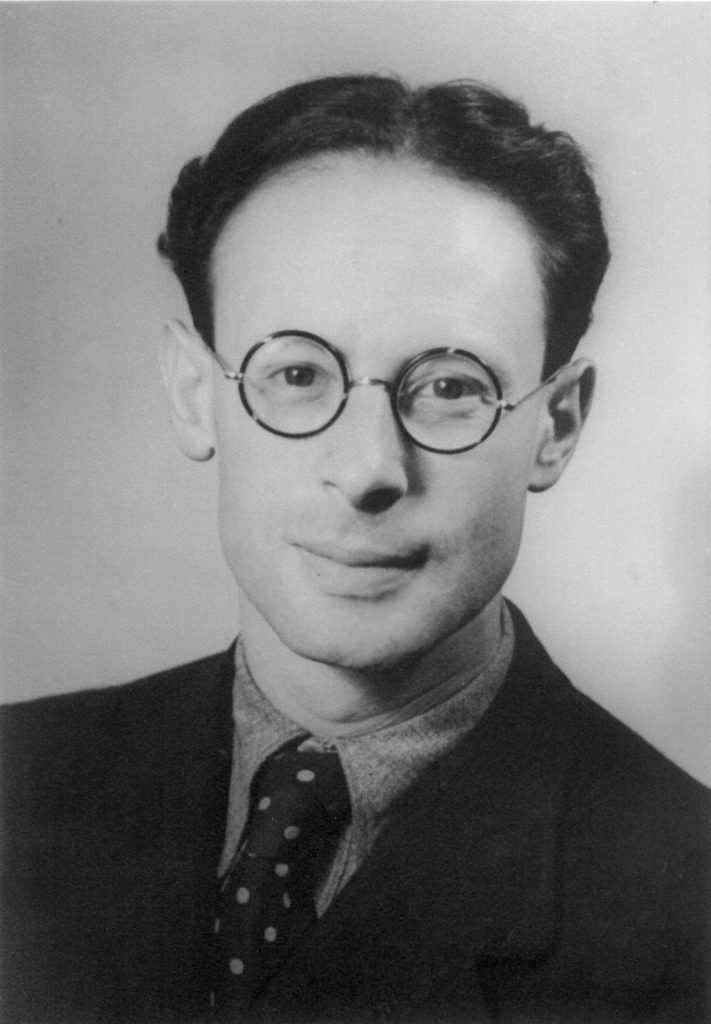
Cabaud: Of course! He was, however, far less easy to interview. Though he was polite, and a gentleman, I could see that I bored him. Obviously, he sometimes got irritated – he didn’t seem to understand that his sister was as a grande dame of literature and philosophy. I can give you an example.
Later in his life, André had a daughter (Sylvie), who was in her teens. At the dinner table, the daughter (then 16 years old) said: “that Simone was a visionary, what do you make of that?” André was incensed; he got up and replied: “you can’t understand that.” In other words, he wanted nothing to do with mysticism, he wasn’t deeply interested in her writings, but he knew that she was just as great as he was.
Cabaud & Pètrement
Marie Cabaud Meaney [interjects]: Didn’t Madame Weil call you “the detective” because you found so many things?
Cabaud: Madame Weil, and Simone Pètrement who was a friend of hers and Simone, both found out that I had access to sources of information that were not easily available, though archived. I also found records in France and England that were not yet archived. And I found information that no one else could. Thus, I was the first one to put questions, and this before anyone realized that I was raising questions that were difficult to answer. So they called me “the detective,” and I really enjoyed that reputation.
Collins: And what about Simone Pètrement? Did you interview her, and what is your sense of her biography?
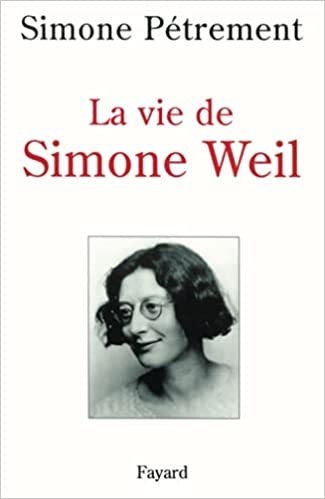
Cabaud: When anybody asks me which is the best biography of Simone Weil, I always answer “Simone Pètrement’s biography.” I did her legwork; I mean that literally. She couldn’t do it because one of her legs was shorter than the other. So it was difficult for her, thus she relied on my work though she checked all my contacts by phone or mail. She used to work in the archives and, like other archivists, was extremely meticulous. She was very careful, much more than I am sometimes. She wasn’t absentminded, so I trusted her more than I trusted myself. She was a marvelous person.
Collins: Albert Camus was still alive when you were researching your biography. Did you attempt to interview him?
Cabaud: I had to contact Camus to obtain permission from Gallimard to quote extensively from Simone Weil’s unpublished works. And so, I had a short interview with him in his office. While I had contacted a hundred or more people for my research, two people stuck out in my mind: Camus and Thibon. They had the keenest minds and were the greatest and most learned people I met. They both impressed me; their intellectual acuity astonished me.
Collins: Does every generation or every other need a Simone Weil? If so, why?
Cabaud: [Chuckles.] There was only one Simone Weil; there could never be another. I mean, can you think of any philosophers who died at 34 and has written anything comparable to what she did? She was a special genius, there could never be another like her, of her character and caliber.
Weil’s Notebooks
Collins: You write: “it is not possible to assume that Simone Weil was entirely in agreement with all that appears in her Notebooks or La Connaissance surnaturelle or to try to reconstruct all her philosophy from such fragments alone.” In light of that, what is your view of Gustave Thibon’s selection and thematic arrangement of her notebook fragments as set out in Gravity and Grace?
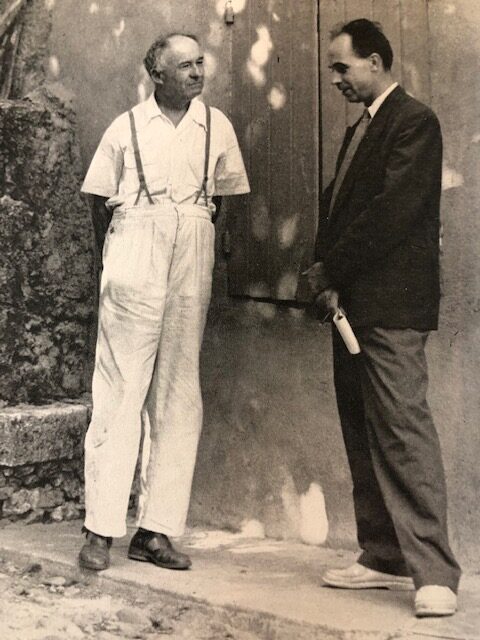
Cabaud: Well, Gustave Thibon went a bit out on a limb — this he did. That said, when she left her notebooks with him, she said, “you can do what you want with them.” And that is just what he did. Now, I haven’t checked his work over line-by-line and compared it to what she gave him. What Thibon did was sometimes judicious, sometimes less judicious, and sometimes subjective.
Collins: How should we approach our reading of Weil’s notebooks?
Cabaud: Weil often wrote things in her notebooks as ideas to remember and develop. Can we take all that at face value and stop there? I think not. We have to evaluate what she wrote. In other words, we have to complete an incomplete work. This is very hypothetical, quite difficult; it is something that has been attempted time and again. Some have tried to fill in the missing links and create a picture of her thought.
When you see her notebook entries individually, you pause, and ask: “what does this mean?” For example, you can infer an opposite point of view from certain things she wrote. So, it is a challenge to determine what she actually meant. I have attempted to meet this challenge, but only on certain points. Thus, I have not done the kind of more comprehensive work that would be needed in order to do justice to her overall thought in all its vagaries.
On Religions other than Christianity, and on miracles
Collins: You note that Weil maintained that “there are religions other than Christianity that convey, in much more lucid terms, truths that are only implicitly contained in the Christian religion.” In light of that, how important is Eastern philosophy (e.g., texts such as the Bhagavad Gita and the Upanishads) to Weil’s thought and can it be seen as a part of her Christian thought, and vice versa?
Cabaud: [Pause] I do not now want to enter into this field too much, though it is something one needs to investigate
How can one understand Simone Weil’s criticism of Christianity without considering the fact that she thought there had been some previous revelations of God that established certain necessary truths? This is a book I could tackle if I lived to be 120, in which case I will probably write it. Such a project would take pages and pages to explain.
In the Bhagavad Gita Weil saw a sign of revelation; sometimes she found passages in it that struck her as coming directly from God. Likewise, there were similar signs in the Our Father prayer, which she read and recited daily with Thibon in Greek and with total concentration.
There is such a thing as natural wisdom. Before the advent of Christianity, people like Socrates and Plato discovered truths that followed the light of natural wisdom. The same holds true for some of the Eastern mystics she read. Again, one could write a book about this.
Collins: “The notion of the miraculous is ‘devoid of meaning,” says Weil. “[T]he age of miracles is past,” you write. Such declarations seem enigmatic given Simone’s mystical experiences in 1938 and again in 1941-42. Were these no more than, as you put it, “the unmistakable stamp of [her] creative imagination”? And are mysteries synonymous with miracles?
Cabaud: [Chuckles] Well, I can only refer to the facts that I’ve heard about. Certain people seem to have benefitted from private revelations, and there is no doubt about it and one could make a long list of such matters that would be very interesting. Simone Weil stretched the field of private revelation to an extent that I cannot follow because . . . she had the light of natural reason, she had the help of her own genius. I don’t see private revelations existing outside of religion; the matters needs to be qualified in a precise way.
On the one hand, Simone Weil was ready to believe in private revelations. On the other hand, she was very skeptical of miracles. She thought people took from what they called “miracles” certain things for which there was no explanation. She thought that people sometimes saw in “miracles” things they shouldn’t. In this regard, she was quite skeptical. So, she was very surprised when she had a mystical experience; she wasn’t expecting it. She hadn’t thought this was possible. She didn’t think God would reveal Himself this way. . . . [Then again,] she sees the sign of a revelation in the Bhagavad Gita. [Yet,] . . . when she benefits from this she was very suspicious until she made a deal with Gustave Thibon to recite every day the Our Father in Greek, with total concentration. And that’s when the mystical experiences happened again. And this time she had the impression, “oh, I think God wants to speak to me. Well, if He wants to speak to me that much, it means I should say yes. I should go along.” That’s why she could spend hours, in what she considered, the real presence of Christ in the sacrament because she had the presence in her mind and in her heart. She had become an authentic mystic. . . . . Such revelations didn’t benefit her alone since others could profit from them when they heard of them.
Marie Cabaud Meaney [interjects]: I have one question, though. Ronald was quoting you when he said: “[T]he age of miracles is past.” Were you just summarizing Simone Weil there, or was this your own opinion?
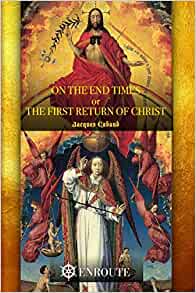
Cabaud: That’s not my opinion. On the contrary, miracles can be explained in two ways. First of all, there have never been more people than today who have visions, locutions, and mystical experiences. And secondly, there is what the prophets say: we are getting closer to the end of times even though the end of times is not the end of the world. I have written a book about this [see On the End Times, or The First Return of Christ (2019)].
Collins: You write: “Up to a point, Simone Weil’s theology . . . can . . . dispense with Christ in his incarnational aspect. She sees no need of him for the salvation of the soul.” As someone who once had been a seminarian, do you suppose any Christian could value Weil’s work in the face of such an assertion?
Cabaud: That is what I wrote in my PhD, some of which might have been a bit hasty. Perhaps I should have taken more time to scrutinize all of what I wrote. . . .
Marie Cabaud Meaney [interjects]: Let me qualify this, if I may. My Father is not hasty; he spent a lot of time and thought on his dissertation. Still, he did not rewrite things as often as he might have wanted . And I think this is one of those lines which, if he were to rewrite it, would be written differently.
The Need for Roots

Collins: After reading Weil’s The Need for Roots, Connor Cruise O’Brien declared: “I have considerable difficulty in understanding [the book] and cannot claim to know how to ‘apply it’ or how much sense it makes even to talk about applying it.” How would you respond to that?
Cabaud: Well, I consider this book to be a masterpiece. In it, Simone Weil tried to respond to the question of what to do when people lose their roots. For her, this was synonymous with losing their soul. For instance, consider the United States.
One of the reasons that, even today, it has so much racial strife is that these poor descendants of slaves have lost their links to their past; they’ve been broken. They have been robbed of the history and wisdom of their ancestors. It takes centuries to even attempt to cure this evil. To this day, the United States continues to be corrupted by the evil done by slavery and by the uprooting done to African Americans.
A loss of roots, to change the metaphor, is also a loss of a compass. Such a compass is an instinctive guide, a way of life based on one’s culture. When you are surrounded by your culture, you are supported by it. But when you break that, there are terrible consequences. That is what I pointed out in my book on Luther.
The front-line nursing-squad proposal
Collins: Weil’s “Memorandum on the Formation of a Front-Line Nursing-Squad” has been the subject of much commentary and criticism. What is your sense of it, both in practical and moral terms?
Cabaud: Of course, this was a wild idea, the idea of front-line nurses. Though it was an excellent idea, it was an impractical one. When de Gaulle read it, he thought she was crazy. She was only asking for the formation of a special group of women who were willing to make a heroic commitment. She wouldn’t have recruited someone who was not ready for such a commitment. If somebody was going to die, it had to be her. She had a sacrificial soul. All her life she sought to give her life for a worthwhile cause.
Collins: “Did she become a victim of the very ‘philosophy’ she had constructed?” Those are your words, offered near the end of your biography. How would you answer your question and why did you place the word philosophy in quotes?
Cabaud: Of course. As with her front-line nurses proposal, she tried so hard to place herself in situations where it was obvious she would not come back alive. Or, consider when she was in her early 20s and went off to Germany to liberate some political prisoners. She hoped to find some brave men to help her in this impossible attempt. She shared this idea with one of her friends who thought she was crazy. And then she went to Spain to fight in the civil war. And what do you expect?
The “process of mysticfication”
Collins: You caution against the “process of mystification.” In the six or so decades since you published your first biography of her, do you think the mystification matter has become a problem when it comes to Weil and her legacy? If so, can it be corrected?
Cabaud: I am full of admiration for the scholars of Simone Weil. They know more than I do; some of them spend their life on it. I spent only ten years. Some of the articles, for example, in the Cahiers Simone Weil are quite impressive. Though I have not continued to write on her, I do keep up on what is written about her.
Collins: In her “Draft for a Statement of Human Obligations” essay, Weil wrote: “there is a reality outside the world, that is to say, outside space and time, outside man’s mental universe, outside any sphere whatsoever that is accessible to human faculties” (itals. added). That idea is central to her thought, yet at the same time, it is bewildering. Can you shed some light on that for us?
Cabaud: Well, we’d have to go into an extended discussion of mysticism, and right now there is no time for that. Still, I entirely agree with her and it is magnificent the way she states it — and that is one of the reasons why I treasure her so much. She expresses herself so well in so many instances where others cannot find the right words. That is part of her greatness . . . somewhat like St. Augustine and Pascal.
Marie Cabaud Meaney [interjects, though at first she was hesitant to do so]: I think I can add a very little something to that question before we conclude. Obviously, when Weil was writing her “Human Obligations” essay she was trying to reach a broad public, so she used words she thought would be universally acceptable in discussing this reality outside of the world – so she spoke simply. If she had been writing in a more religious context, she would have expressed her thoughts in a different way, calling the “reality outside the world” the supernatural. And what is that supernatural? – the absolute Good; it is God.
So, what she really wanted to do was to show people that the center of reality is God. If you do not accept this reality – in politics, or in drafting a new constitution, or in organizing a government after the War – everything will be twisted and deformed. That is it in a nutshell, though I could go into this quite a bit more. [See Marie Cabaud Meaney, “Understanding Simone Weil’s ‘Science of the Supernatural’ within the Context of Rationalism”, Spaziofilosofico 17, July 2016, pp. 351-365, & “The Supernatural as a Remedy to Totalitarian Regimes: Simone Weil and the Sanctity of the Eucharist,” in A. Rebecca Rozelle-Stone, & Lucian Stone, eds., The Relevance of the Radical: Simone Weil 100 Years Later, New York: Continuum, 2010, pp. 38-52.]
Thinking dialectically

Collins: Your life clock reads 98 years. That said, what tenet of Weil’s legacy has had the most lasting impact on you?
Cabaud: She taught me to think dialectically, as with the dialectics of Plato or Hegel . . . there are also the dialectics of Martin Luther, who helped invent the modern version of dialectics.
Collins: Thank you, Jacques and Marie, too: In this journey and the journey of a thousand years, as it is said, may you both fare/well.
Other Q&A Interviews
— Unfinished: On Venice Saved – a Q&A with Silvia Caprioglio Panizza and Philip Wilson
— Performing “The Iliad or Poem of Force”: A Q&A Interview with Simona Giurgea
— Weil’s Single-Minded Commitment to Truth: A Q & A Interview with J. P. Little
— A Q&A Interview with Eric Springsted
2 Recommendations
